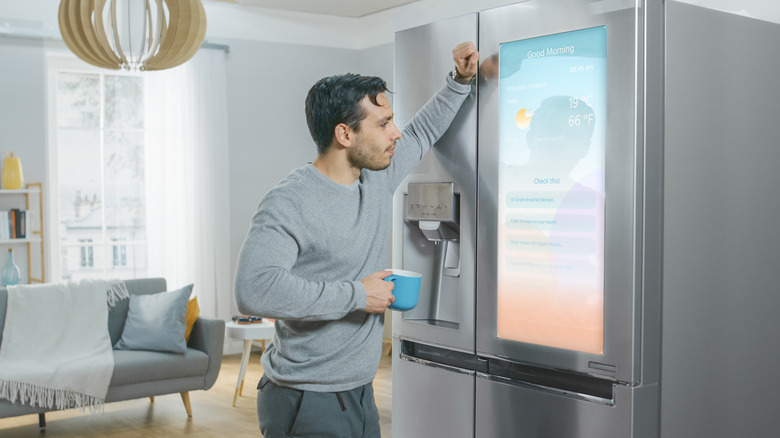The Hidden Downsides To Smart Refrigerators
We may receive a commission on purchases made from links.
Whether you're looking to spruce up your kitchen or completely automate your house, it's hard to deny that smart refrigerators look really cool. A fridge that understands your routines, talks to your other appliances, suggests what to make for dinner based on its contents, and lets you send messages to friends? We must be living in the future! It's no wonder that the demand for smart fridges is expected to increase over the next few years, per Mordor Intelligence. Between the fridges' cool features and FOMO, it's hard to resist purchasing a unit of your own.
But while it can be fun to splurge on fancy new technology, smart refrigerators also come with a wide range of hidden downsides. In fact, using your shiny new smart fridge might even take up more time than a "dumb" fridge! While you might find the trade-off worth it, it's important to fully understand smart fridges' downsides to make an informed decision before you splurge.
Cost of a smart refrigerator
When you're looking to buy a smart fridge, you'll probably notice that they cost significantly more than standard fridges. While this might seem fair since smart fridges have more functions, some of the price tags are extremely expensive. For example, Samsung's smart fridges can cost up to $4,599 USD (via Samsung). Even if you don't go for the fanciest model, you can still expect to spend several thousand dollars on your new fridge.
But isn't the large price tag a one-time expense? That's not as bad, right? Wrong! Since smart refrigerators are more complex inside than their dumb counterparts, they cost significantly more to repair. According to Angi, smart fridge repairs are two times more expensive on average. The fridges' digital features also require additional energy, so you can expect your electric bill to go up as well. In other words, if you're thinking of splurging on a smart refrigerator, you need to be prepared for the bills to keep piling in.
Your refrigerator's lifespan
Remember how much you paid for your new smart fridge? You should plan on buying another unit within a few years.
As electronics get older and become an increasing security risk, manufacturers drop support for them. While this isn't anything new — for example, iPhones no longer support most old applications — smart appliances have notoriously short lifespans. According to Forbes, smart fridges may lose access to their software after as little as two years. If you purchased your smart fridge near the end of the year to take advantage of sales, you may have even less time to enjoy its features. In stark comparison, dumb fridges last for about 14 years (via Science Direct).
Once a smart fridge's software is disabled, owners are left with two choices: use the refrigerator as a dumb fridge (but with higher repair costs) or replace it with a brand new model. Although both options are extremely expensive, neither is particularly desirable.
Smart fridges might not save time
Okay, let's be real. It's very convenient (and cool) if your fridge can tell you what you have in stock. It's even better when your fridge suggests recipes based on your current ingredients. But most people associate smart devices and home automation with convenience. Although these features are extremely useful, they're probably more time-consuming than you think.
While some fridges have cameras or barcode scanners that automatically detect the contents on their shelves, as noted by The Verge, most require you to manually log each piece of food that you buy. You'd also have to log what you remove from the fridge whenever you decide to eat. Since the simple action of removing food from your fridge becomes so much more elaborate, we'd hesitate to call any of the related features convenient. In the long run, it would probably be faster just to look up your own recipes.
Smart fridges can be a major security risk
As smart fridges get older, they don't just lose their functionality — they also turn into an increasingly dangerous security risk. From day one, smart refrigerators are an easy connection in your home's network that hackers can target. They generally include very little security and can provide criminals with a back door to the rest of your devices, warns Newsweek. But things only get worse from there.
Since many smart refrigerator manufacturers don't prioritize security, they're slow to cover up any known weaknesses. This makes it much easier for any would-be hackers to get in. Plus, once your refrigerator is a few years old and stops receiving software updates from the manufacturer, it becomes an even more enticing target since hackers know that any security weaknesses will stick around. As if that wasn't enough, it can be impossible to tell if you're hacked since many hackers will take care to cover their tracks.




